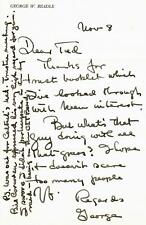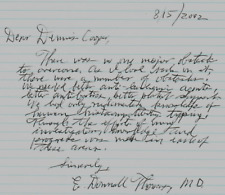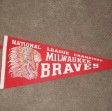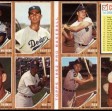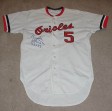When you click on links to various merchants on this site and make a purchase, this can result in this site earning a commission. Affiliate programs and affiliations include, but are not limited to, the eBay Partner Network.
Up for sale a Sir Derek Barton Hand Signed 3X5 card. Dr Barton received the Nobel Prize in Chemistry in 1969.
ES-4809
Sir
Derek Harold Richard Barton FRS FRSE (8
September 1918 – 16 March 1998) was an English organic chemist and Nobel Prize laureate for
1969. Barton was born in Gravesend, Kent, to William Thomas and Maude Henrietta Barton
(née Lukes). He attended Gravesend Grammar School (1926–29), The King's School (1932–35) and Medway Technical College
(1937–39). In 1938 he entered Imperial College London,
where he graduated in 1940 and obtained his PhD degree in Organic Chemistry in 1942. From 1942 to 1944 Barton was a
government research chemist, then from 1944 to 1945 he worked for Albright and Wilson in Birmingham. He then became Assistant Lecturer in the
Department of Chemistry of Imperial College, and from 1946 to 1949 he was ICI Research
Fellow. During 1949 and 1950 he was visiting lecturer in natural products
chemistry at Harvard University, and
was then appointed reader in organic chemistry and, in 1953, professor at Birkbeck College.
In 1955 he became Regius
Professor of Chemistry at the University of Glasgow, in
1957 he was appointed professor of organic chemistry at Imperial College. In 1950, Barton showed that organic
molecules could be assigned a results accumulated by chemical physicists, in particular by Odd Hassel. Using this new technique of conformational analysis,
he later determined the geometry of many other natural product molecules. In
1969, Barton shared the Nobel Prize in Chemistry with Odd Hassel for "contributions to the development of
the concept of conformation and its application in chemistry." In 1958
Barton was appointed Arthur D. Little Visiting Professor of Massachusetts
Institute of Technology, and in 1959 Karl Folkers Visiting Professor
of at the Universities of Illinois and Wisconsin. In 1960 he was
appointed a visiting professor of the University of California,
Berkeley, spending much of his time with William H. Dauben's group. The
same year he was elected a foreign honorary member of the American
Academy of Arts and Sciences. In
1949 he was the first recipient of the Corday-Morgan Medal and
Prize awarded by the Royal Society of Chemistry.
In 1954 he was elected a Fellow of the Royal
Society and the International Academy of Science as well as, in
1956, a Fellow of the Royal Society of Edinburgh;
in 1965 he was appointed member of the Council for Scientific
Policy. He was knighted in 1972, becoming
formally styled Sir Derek in
Britain. In 1978 he became Director of the Institut de
Chimie des Substances Naturelles (ICSN - Gif Sur-Yvette)
in France. In 1977, on the occasion of the centenary of the Royal
Institute of Chemistry, the British Post Office honoured him, and 5 other Nobel
Prize-winning British chemists, with a series of four postage stamps featuring
aspects of their discoveries. He
moved to the United States in 1986 (specifically Texas)
and became distinguished professor at Texas A&M University and
held this position for 12 years until his death. In 1996, Barton published a
comprehensive volume of his works, entitled Reason and Imagination:
Reflections on Research in Organic Chemistry. As well as for his work on
conformation, his name is remembered in a number of reactions in organic
chemistry such as the Barton reaction, the Barton decarboxylation,
and Barton is the doctoral advisor of David Crich, a
prestigious chemistry professor at Wayne State University.




